外研版(2019) 选择性必修第二册 Unit 1 Growing Up Developing ideas Reading 课件(23张)
文档属性
| 名称 | 外研版(2019) 选择性必修第二册 Unit 1 Growing Up Developing ideas Reading 课件(23张) | 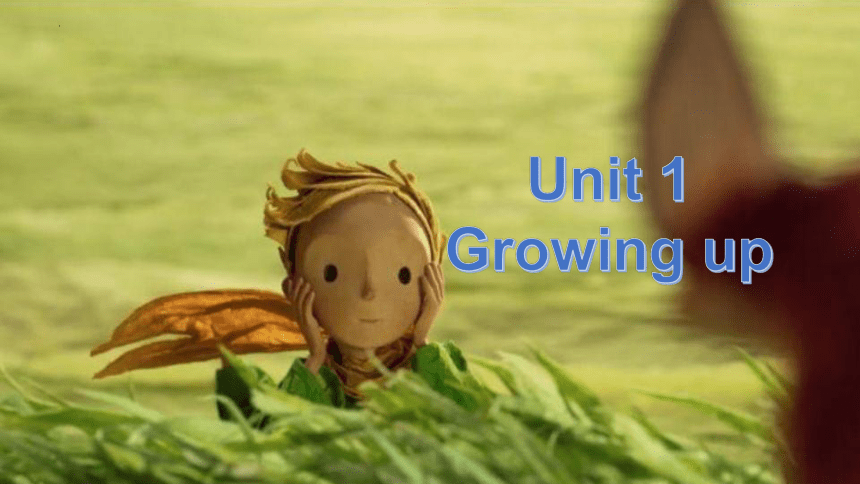 | |
| 格式 | pptx | ||
| 文件大小 | 3.0MB | ||
| 资源类型 | 教案 | ||
| 版本资源 | 外研版(2019) | ||
| 科目 | 英语 | ||
| 更新时间 | 2022-09-21 13:21:57 | ||
图片预览

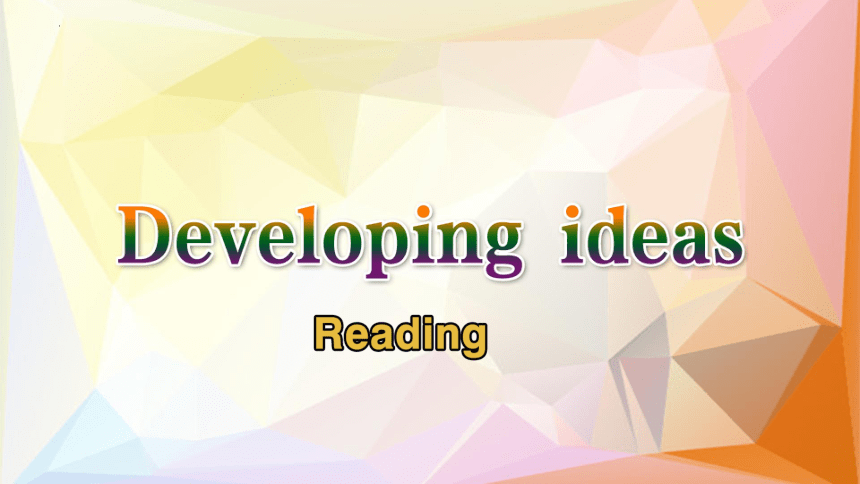
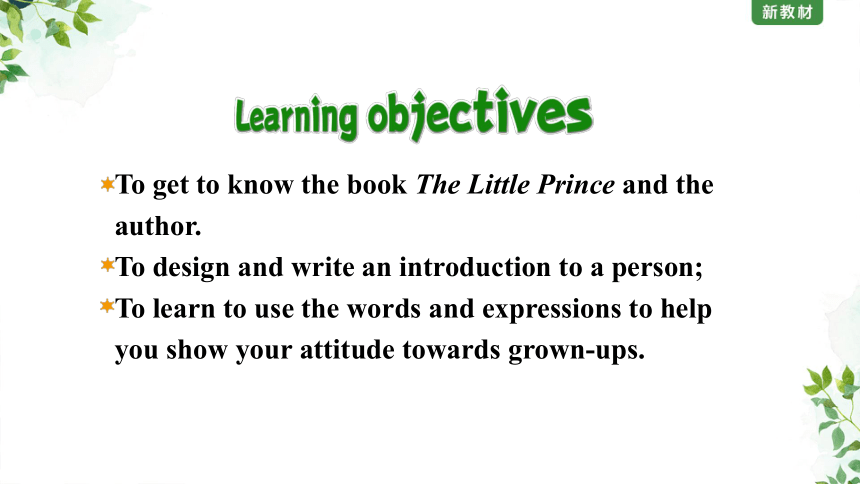
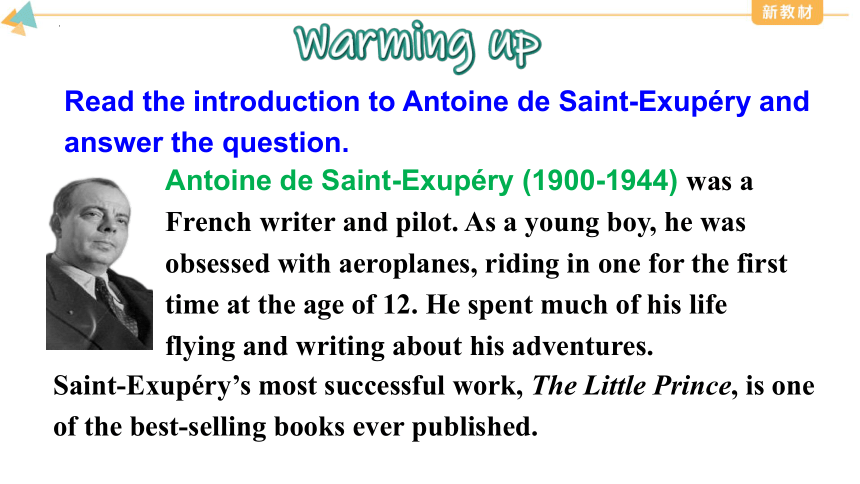
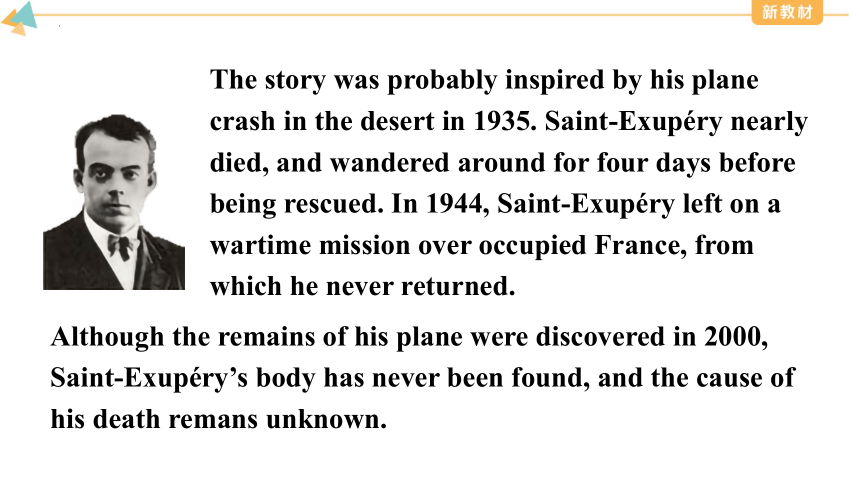
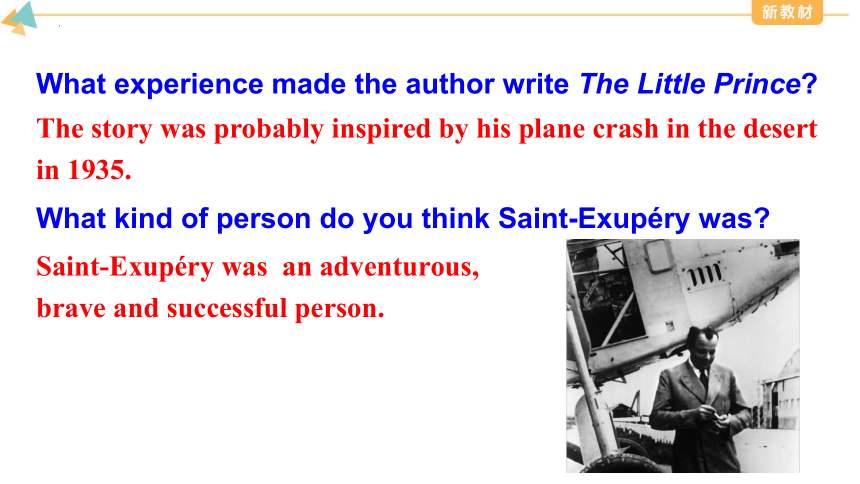
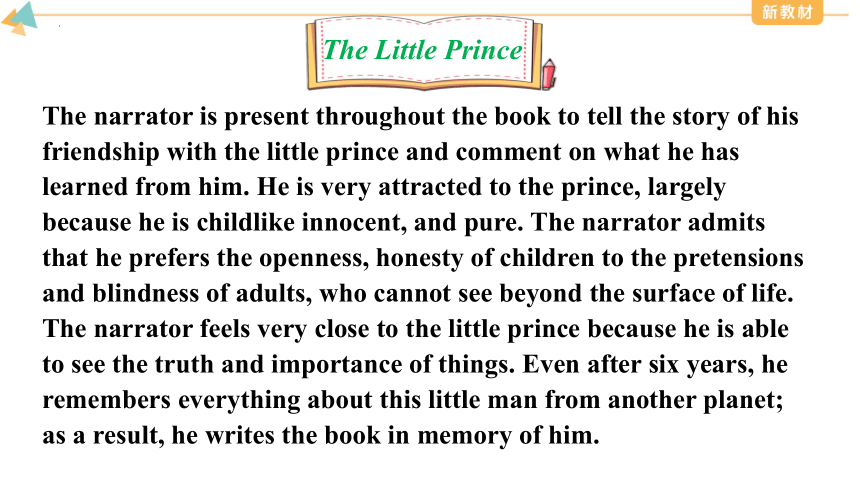
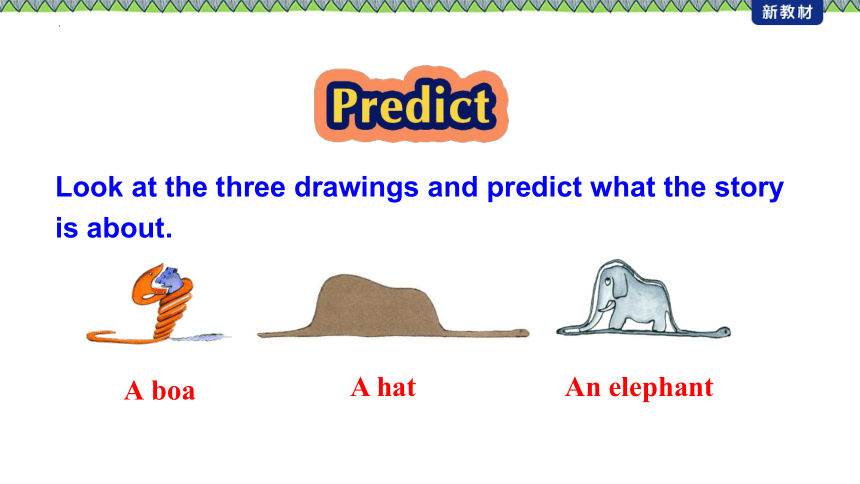
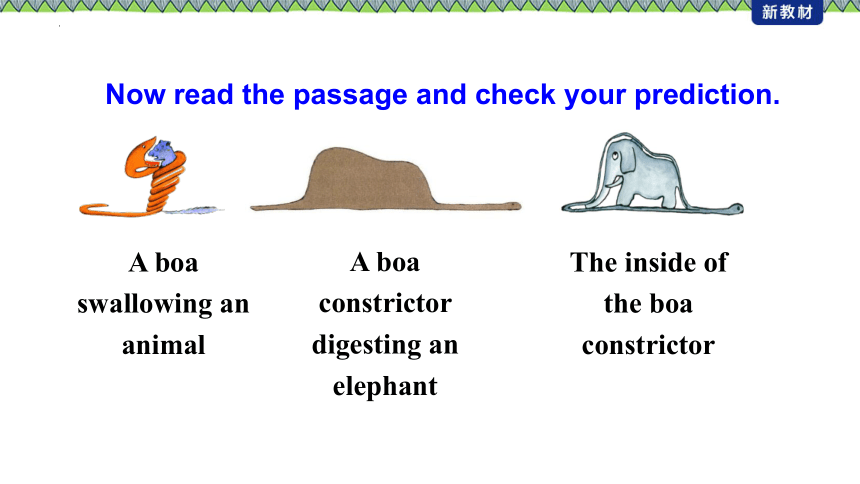
文档简介
(共23张PPT)
Unit 1
Growing up
To get to know the book The Little Prince and the author.
To design and write an introduction to a person;
To learn to use the words and expressions to help you show your attitude towards grown-ups.
Read the introduction to Antoine de Saint-Exupéry and answer the question.
Antoine de Saint-Exupéry (1900-1944) was a French writer and pilot. As a young boy, he was obsessed with aeroplanes, riding in one for the first time at the age of 12. He spent much of his life flying and writing about his adventures.
Saint-Exupéry’s most successful work, The Little Prince, is one of the best-selling books ever published.
The story was probably inspired by his plane crash in the desert in 1935. Saint-Exupéry nearly died, and wandered around for four days before being rescued. In 1944, Saint-Exupéry left on a wartime mission over occupied France, from which he never returned.
Although the remains of his plane were discovered in 2000, Saint-Exupéry’s body has never been found, and the cause of his death remans unknown.
What experience made the author write The Little Prince
The story was probably inspired by his plane crash in the desert in 1935.
What kind of person do you think Saint-Exupéry was
Saint-Exupéry was an adventurous, brave and successful person.
The narrator is present throughout the book to tell the story of his friendship with the little prince and comment on what he has learned from him. He is very attracted to the prince, largely because he is childlike innocent, and pure. The narrator admits that he prefers the openness, honesty of children to the pretensions and blindness of adults, who cannot see beyond the surface of life. The narrator feels very close to the little prince because he is able to see the truth and importance of things. Even after six years, he remembers everything about this little man from another planet; as a result, he writes the book in memory of him.
The Little Prince
Look at the three drawings and predict what the story is about.
A boa
A hat
An elephant
Now read the passage and check your prediction.
A boa swallowing an animal
A boa constrictor digesting an elephant
The inside of the boa constrictor
Choose the author’s attitude towards grown-ups and find evidence to support your choice.
1 Grown-ups are more practical than children. They want to teach children knowledge that will be useful in the future.
2 Grown-ups are no better than children. They lack imagination and only care about matters of consequence.
3 Grown-up are more knowledgeable than children. They can understand everything by themselves.
1. The book said boa constrictors must digest their prey before they can sleep.
2. The grown-ups thought the second drawing was scary.
3. The grown-ups reaction made the child lose interest in drawing.
4. What the adults told the child to learn was useless for his future work.
5. All the adults the child met didn't understand what his first drawing was.
T
T
F
F
F
The structure Paragraphs Main idea
Part 1 Paras. 1-3
Paras. 4-5
Part 2 Paras. 6-7
Paras. 8
Part 3 Paras. 9-12
The Little Prince
I was deep into a drawing from a book.
The grown-ups’ response to my first drawing.
The grown-ups’ response to my second drawing.
The drawing experience made me choose a new profession.
Later in my life, I held an attitude towards grown-ups.
Read the sentences form the passage and answer the questions.
… I have had a great many encounters with a great many people who have been concerned with matters of consequence.
And the grown-up would be greatly pleased to have met such a sensible man.
1. What does the author really mean by these sentences
Most of the adults I have met are the same. They focus on practical matters only and seldom pay attention to imagination or creativity. If I pretend to think the way they do, the adults will conclude that I am sensible and mature.
2. What figure of speech does the author use How does this figure of speech help to express the author’s attitude
Irony. This figure of speech enables the author to indicate his low opinion of adults’ behavior and values by stressing such things.
Irony is a subtle figure of speech that refers to things one says that are the opposite of what one really means. It has a humorous, emphatic or sarcastic effect. For example: Fine, don’t buy me an airline ticket. I’ll just swim across the ocean!
1. Decide whether you agree with the author’s attitude towards grown-ups and why.
Give a talk about your attitude towards grown-ups.
I totally agree with the author because… / I don’t agree with the author because…
In my view…/ In my eyes…/ Personally, I think…
Take… for example…/ For instance…
To conclude…/ To sum up…/ All in all…
2. Think of some examples to support your opinions and make notes.
Opinions: Examples:
Grown-ups think the disadvantages of using cell phones overweigh the advantages. They try their best to forbid child to use cell phones
3. Organize your talk following the steps below.
Explain the author’s attitude towards grown-ups.
State your own opinions.
Give supporting examples.
Conclude by summarizing your opinions.
4. Give your talk to the class.
Now think about your performance during the group discussion. How well did you actively participate and contribute ideas
1. What were the grown-ups’ responses to the author’s Drawing Number One and Drawing Number Two Why do you think they responded in this way
They thought the author’s Drawing Number One was just about an ordinary hat. When seeing the author’s Drawing Number Two, they advised the author to change his focus to other subjects such as geography, history, arithmetic and grammar. Grown-ups are more practical and they think a boy should be devoted to his study and should spend time doing useful and meaningful things.
2. According to the author, what is a child’s most valuable trait Do you agree with him
Imagination and genuineness. I agree with him because it is the nature of a child and should not be ignored.
3. After reading the two passages in this unit, think about what you may acquire and lose as you grow up. Share your ideas with the class.
I acquire many things. Such as knowledge, experience, strength and persistence. I also lose many things. Such as innocence, playfulness, activity, joy, curiosity.
And now here is my secret, a very simple secret. It is only with the heart that one can see rightly; what is essential is invisible to the eyes.
—The Little Prince
Write a passage about your attitude towards grown-ups in 90 words.
Unit 1
Growing up
To get to know the book The Little Prince and the author.
To design and write an introduction to a person;
To learn to use the words and expressions to help you show your attitude towards grown-ups.
Read the introduction to Antoine de Saint-Exupéry and answer the question.
Antoine de Saint-Exupéry (1900-1944) was a French writer and pilot. As a young boy, he was obsessed with aeroplanes, riding in one for the first time at the age of 12. He spent much of his life flying and writing about his adventures.
Saint-Exupéry’s most successful work, The Little Prince, is one of the best-selling books ever published.
The story was probably inspired by his plane crash in the desert in 1935. Saint-Exupéry nearly died, and wandered around for four days before being rescued. In 1944, Saint-Exupéry left on a wartime mission over occupied France, from which he never returned.
Although the remains of his plane were discovered in 2000, Saint-Exupéry’s body has never been found, and the cause of his death remans unknown.
What experience made the author write The Little Prince
The story was probably inspired by his plane crash in the desert in 1935.
What kind of person do you think Saint-Exupéry was
Saint-Exupéry was an adventurous, brave and successful person.
The narrator is present throughout the book to tell the story of his friendship with the little prince and comment on what he has learned from him. He is very attracted to the prince, largely because he is childlike innocent, and pure. The narrator admits that he prefers the openness, honesty of children to the pretensions and blindness of adults, who cannot see beyond the surface of life. The narrator feels very close to the little prince because he is able to see the truth and importance of things. Even after six years, he remembers everything about this little man from another planet; as a result, he writes the book in memory of him.
The Little Prince
Look at the three drawings and predict what the story is about.
A boa
A hat
An elephant
Now read the passage and check your prediction.
A boa swallowing an animal
A boa constrictor digesting an elephant
The inside of the boa constrictor
Choose the author’s attitude towards grown-ups and find evidence to support your choice.
1 Grown-ups are more practical than children. They want to teach children knowledge that will be useful in the future.
2 Grown-ups are no better than children. They lack imagination and only care about matters of consequence.
3 Grown-up are more knowledgeable than children. They can understand everything by themselves.
1. The book said boa constrictors must digest their prey before they can sleep.
2. The grown-ups thought the second drawing was scary.
3. The grown-ups reaction made the child lose interest in drawing.
4. What the adults told the child to learn was useless for his future work.
5. All the adults the child met didn't understand what his first drawing was.
T
T
F
F
F
The structure Paragraphs Main idea
Part 1 Paras. 1-3
Paras. 4-5
Part 2 Paras. 6-7
Paras. 8
Part 3 Paras. 9-12
The Little Prince
I was deep into a drawing from a book.
The grown-ups’ response to my first drawing.
The grown-ups’ response to my second drawing.
The drawing experience made me choose a new profession.
Later in my life, I held an attitude towards grown-ups.
Read the sentences form the passage and answer the questions.
… I have had a great many encounters with a great many people who have been concerned with matters of consequence.
And the grown-up would be greatly pleased to have met such a sensible man.
1. What does the author really mean by these sentences
Most of the adults I have met are the same. They focus on practical matters only and seldom pay attention to imagination or creativity. If I pretend to think the way they do, the adults will conclude that I am sensible and mature.
2. What figure of speech does the author use How does this figure of speech help to express the author’s attitude
Irony. This figure of speech enables the author to indicate his low opinion of adults’ behavior and values by stressing such things.
Irony is a subtle figure of speech that refers to things one says that are the opposite of what one really means. It has a humorous, emphatic or sarcastic effect. For example: Fine, don’t buy me an airline ticket. I’ll just swim across the ocean!
1. Decide whether you agree with the author’s attitude towards grown-ups and why.
Give a talk about your attitude towards grown-ups.
I totally agree with the author because… / I don’t agree with the author because…
In my view…/ In my eyes…/ Personally, I think…
Take… for example…/ For instance…
To conclude…/ To sum up…/ All in all…
2. Think of some examples to support your opinions and make notes.
Opinions: Examples:
Grown-ups think the disadvantages of using cell phones overweigh the advantages. They try their best to forbid child to use cell phones
3. Organize your talk following the steps below.
Explain the author’s attitude towards grown-ups.
State your own opinions.
Give supporting examples.
Conclude by summarizing your opinions.
4. Give your talk to the class.
Now think about your performance during the group discussion. How well did you actively participate and contribute ideas
1. What were the grown-ups’ responses to the author’s Drawing Number One and Drawing Number Two Why do you think they responded in this way
They thought the author’s Drawing Number One was just about an ordinary hat. When seeing the author’s Drawing Number Two, they advised the author to change his focus to other subjects such as geography, history, arithmetic and grammar. Grown-ups are more practical and they think a boy should be devoted to his study and should spend time doing useful and meaningful things.
2. According to the author, what is a child’s most valuable trait Do you agree with him
Imagination and genuineness. I agree with him because it is the nature of a child and should not be ignored.
3. After reading the two passages in this unit, think about what you may acquire and lose as you grow up. Share your ideas with the class.
I acquire many things. Such as knowledge, experience, strength and persistence. I also lose many things. Such as innocence, playfulness, activity, joy, curiosity.
And now here is my secret, a very simple secret. It is only with the heart that one can see rightly; what is essential is invisible to the eyes.
—The Little Prince
Write a passage about your attitude towards grown-ups in 90 words.
